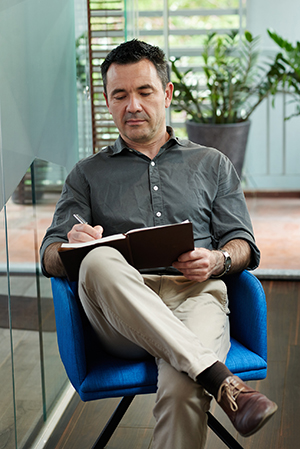Brain Tumors: Coping with Thinking and Memory Problems
Brain Tumors: Coping with Thinking and Memory Problems
How brain tumors and their treatment affect thinking
Brain tumors may affect your ability to think, reason, and remember (cognition). Many people with brain tumors also have problems with these kinds of thinking skills:
Concentration
Language skills
Treatment for the tumor, such as chemotherapy, may also harm the brain and cause thinking problems. Talk with your doctor to find out if your treatment might do this. These are some treatments that can cause damage:
Surgery
Radiation
Chemotherapy
Some other medicines, such as medicines to prevent seizures (anticonvulsants), may also affect your thinking.
Thinking problems may affect both basic and advanced thinking:
Basic thinking skills are thought, attention, and impulsive behavior
Advanced thinking skills are the ability to plan, organize, and make decisions
Where the tumor is and how much damage it causes affect the type and severity of the problems.
Thinking problems may be slow to show up. You may not notice any problems at all while physically recovering from surgery or radiation. But when you get back to your normal routine, you may find tasks that used to be easy have become harder. Or they might even be impossible.
Tips for people with problems thinking or remembering
If you find you are having trouble concentrating or remembering, consider these tips. They might help improve your quality of life and reduce frustration:
Do your best to be better organized.
Get in the habit of writing down or recording your plans and appointments. Make daily “to do” lists. Or use an organizer to help keep track of things you want or need to do.
Schedule household tasks throughout the week to keep them from piling up.
Make sure common household items are easy to find. These include the TV remote, keys, envelopes, and stamps.
Organize shopping lists by aisle. This will cut down on wandering.
Find someone to help with childcare, if needed.
Focus on one task at a time. Don't try to multitask.
Organize your medicines so that they are easy to remember.
Keep a regular sleep schedule.
Pace yourself to prevent exhaustion.
Talk with your doctor or nurse about starting an exercise program, such as walking, and about medicines or other treatments that might be helpful.
Ask for help from family members or friends if you need it. They can help you both emotionally and with daily activities.
Write down all your questions about your disease and treatment so that they are easy to find when you go to the doctor.
Some people find that keeping a diary helps them cope. Knowing what time of day problems occur or what activities are more difficult can help you understand what affects your memory. This information can also help you plan activities. You can also use this to describe your memory problems to your doctor.
Cognitive rehabilitation can help
It's important to make sure your doctor knows about any problems you are having. He or she has ways to help. Medicines might be helpful for some people. Cognitive rehabilitation can also help people who have these types of problems. Mental exercises are one part of rehabilitation. Here are examples of exercises a therapist may give you:
To improve thinking and reasoning skills, a therapist may ask you to find the key points in a paragraph. Or the therapist may ask you to review some facts and make the right conclusion.
To improve planning skills, a therapist may ask you to organize a set of instructions.
Learning to use memory tools is another part of cognitive rehab. For example, someone who misses a lot of appointments can learn to use a detailed schedule or calendar. Timers and alarm clocks may help you remember to do household tasks, such as turning off the oven. As you get used to using these tools, you will regain confidence in your ability to make it through the day without forgetting something important.
Ask your doctor or psychologist about cognitive rehab programs. Many major medical centers and university hospitals have a rehabilitation center. The center may have a cognitive rehab program.
Step one—a full evaluation
Your first step in cognitive rehabilitation is a full evaluation by a neuropsychologist trained in brain-behavior relationships. This involves a series of interviews and psychological tests. Your family may take part. They can help the neuropsychologist learn about your behavior before and after the brain tumor. For school children with brain tumors, the psychologist may interview teachers. He or she may watch the child's behavior in class. The evaluation paints a detailed picture of the thinking problems. It allows the psychologist to design a rehabilitation plan.
Cognitive rehabilitation takes commitment
Cognitive rehab programs can vary. They often involve a team of therapists. These might include speech therapists and cognitive training specialists. Experts recommend intensive and holistic (whole person) programs. For example, a more intensive program might give you training for a few hours a day, several days a week. This might continue for several months, before you return to work. Although other cognitive rehab programs may be less demanding, be prepared to make a serious effort with your rehabilitation.
Before you start cognitive rehab, you should be medically stable. You should also have the physical and mental strength to have several hours of therapy a day. Once you enter a rehab program, you may notice an improvement within a few weeks. Other problems may require months or years of work before you see an improvement.
Updated:
June 19, 2018
Sources:
Cognitive function after cancer and cancer-related treatment. UpToDate., Cognitive Rehabilitation in Patients With Gliomas: A Randomized, Controlled Trial. Gehring K. Journal of Clinical Oncology. 2009;27(22):3712-22.
Reviewed By:
Alteri, Rick, MD,Jasmin, Luc, MD
